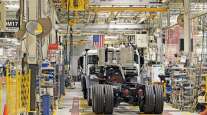Bloomberg News
Intel, Ford Urge Tax Benefits for Chips, US Manufacturing
[Ensure you have all the info you need in these unprecedented times. Subscribe now.]
Foreign producers of semiconductors, electric car batteries and pharmaceuticals will continue to squeeze U.S. manufacturing unless Congress provides more incentives for domestic production, representatives from Intel Corp. and Ford Motor Co. said March 16.
In addition to passenger car production, the chip shortage has strained heavy-duty commercial truck makers. Meanwhile, Class 8 orders have surged in efforts to meet e-commerce demand.
George Davis, Intel’s chief financial officer, told the Senate Finance Committee that lawmakers should consider a wide range of measures, including grants and refundable tax credits, for the U.S. to produce the advanced microprocessing chips that both Democrats and Republicans say is critical to national security.
“If you look to China, Taiwan, South Korea — all the areas where there has been substantial growth in the semiconductor manufacturing taking place — it has been with a coordinated set of policies taking place to incentivize investment, Davis said. “The U.S. has not taken that position.”
RELATED: Class 8 Orders Surge 212% to 43,800
There is bipartisan support for bolstering domestic manufacturing, with Senate Majority Leader Chuck Schumer (D-N.Y.) and Sen. Todd Young (R-Ind.) working on measures to boost U.S. competitiveness with China. The Senate could take up the proposal within months, which would provide new grants for semiconductor manufacturers to build new plants and create regional innovation hubs.
“The supply chain crisis setting off the most alarm bells deals with semiconductors,” Senate Finance Chair Ron Wyden (D-Ore.) said at the hearing. “They are a key component of cars, medical devices, appliances, phones and computers, defense technologies, you name it. Americans don’t roll out of bed without flipping some switch or checking some device that relies on semiconductors.”
Wyden said in a statement March 16 he is working with two Democrats, Debbie Stabenow of Michigan and Michael Bennet of Colorado, on legislation that would provide benefits for domestic manufacturing and renewable energy.

Fleets are investing in tech-based safety tools that inform and forewarn potential risk. But how do they condition and prepare drivers to respond to safety alerts? Find out as the RoadSigns Team speaks with Tom DiSalvi, VP of safety at Schneider National, and Charlie Mohn, director of product innovation at Drivewyze. Hear a snippet, above, and get the full program by going to RoadSigns.TTNews.com.
The legislation “would expand production of critical technologies like semiconductors, batteries and solar components,” the senators said in a statement. “These proposals would significantly increase federal investment in both the technology needed to transition to a net-zero emission economy, and the workers needed to develop and produce that technology.”
President Joe Biden’s infrastructure plan that the White House wants to advance this year could include tax help for companies moving jobs back onshore and expanding domestic manufacturing. As a candidate, Biden called for a 10% tax penalty on U.S. companies that move operations overseas and a 10% “Made in America” tax credit for companies that create jobs in the U.S.
“There needs to be stability and certainty in the tax code,” Jay Timmons, president and CEO of the National Association of Manufacturers, said in the March 16 hearing. “We want to make sure that research costs remain a deduction. We believe there needs to be a broad-based investment tax credit.”
RELATED: Biden to Order Review of Supply Chains
Jonathan Jennings, Ford’s vice president for global commodity purchasing and supplier technical assistance, said Congress should preserve the 21% corporate tax rate. The Biden administration is considering raising the rate to 28% as a way to offset costs of an infrastructure plan.
Jennings also told the panel that Congress needs to pursue legislation that would head off a change to the research and development credit set to take effect at the end of the year.
That change would make the tax credit for research costs less valuable starting in 2022, requiring companies to amortize the cost over several years, rather than allowing them to write off the expenses in the year they are incurred. The provision was included in former President Donald Trump’s 2017 tax overhaul to reduce the cost of that law.
Bipartisan legislation introduced this week would double the value of the R&D credit for some businesses and also allow companies to immediately deduct the costs.
Want more news? Listen to today's daily briefing below or go here for more info:




